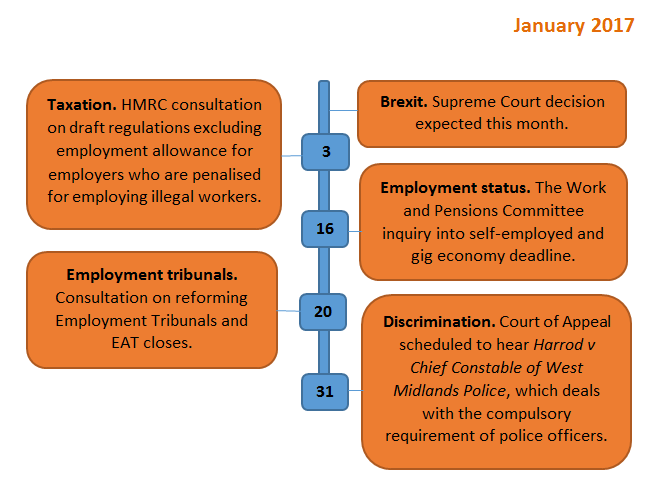As the Brexit case rumbled on in the Supreme Court, with a decision expected early in the New Year, the House of Lords Library published a briefing paper on leaving the EU and the Bar Council Brexit working group published “The Brexit Papers” to help the government assess the most pressing legal concerns arising from the UK government’s decision to withdraw from the EU. For information on the process of Brexit and the protection of employment rights following Brexit, see What to expect in employment law: Brexit.
In a timely decision for anyone whose holiday season is not complete without a discussion of the legal pitfalls of Christmas parties, the High Court has held that a company was not vicariously liable when the managing director assaulted an employee during a drinking session after the office party.
In a case concerning survivor’s pensions for same-sex partners, the ECJ has disagreed with the Advocate General’s opinion, and held that there was no discrimination based on sexual orientation or age where the spouse of the deceased member was unable to benefit because of a “death-bed marriage” restriction in the pension scheme rules. The couple could not have married any earlier because UK law at the time did not permit same-sex marriages.
The Court of Appeal allowed an appeal against an order striking out a claim by four police officers relating to the Metropolitan Police Commissioner’s conduct in litigation in which the officers had been witnesses. The court held that it was arguable that the Commissioner owed the officers a duty of care not to sacrifice their interests and reputation without good reason.
There were several interesting judgements from the EAT, including a decision that medical evidence is not required as a matter of law when claiming personal injury in a discrimination case, although it is usually advisable. In a whistleblowing claim, the EAT considered the grey area in which an allegation might also be a disclosure of information, but went on to hold that an employee’s belief that her manager’s actions were wrong or contrary to industry guidelines did not necessarily amount to belief in a breach of a “legal obligation”. The EAT upheld a decision that a bishop had not unlawfully discriminated by refusing a priest the necessary license to work as a hospital chaplain because he had married his same-sex partner. Compliance with the Church’s doctrine on same-sex marriage amounted to an occupational requirement. In another case, the EAT gave guidance as to how tribunals should deal with costs applications against impecunious claimants whose earning capacity may have the capacity to improve.
The final draft of the gender pay gap regulations was published and will come into force on 6 April 2017. The Government Equalities Office also published its response to the recent consultation on the draft regulations. A new online platform was launched to enable the public to view the gender pay gap by occupation.
The draft Finance Bill 2017 was published. Key provisions for employment lawyers include: changes to the taxation of termination payments, changes to salary sacrifice payments and the removal of tax reliefs associated with employee shareholder status. The government also announced increases to statutory maternity, paternity, adoption and sick pay to apply from April 2017.
There were further developments in relation to the Trade Union Act 2016. Draft regulations were published defining “important public services” for the purposes of the additional ballot threshold in section 3 of the Act, and draft revised codes of practice on industrial action ballots and picketing were published. The Welsh Assembly also announced plans to consult on changes to the Trade Union Act 2016 in relation to devolved areas such as public services.
The Code of Practice (English Language Requirements for Public Sector Workers) Regulations 2016 bring into force, on 22 December, the code of practice on part 7 of the Immigration Act 2016, which requires public-sector workers in customer-facing roles to speak fluent English (or in Wales, English or Welsh).
BEIS and MoJ launched a consultation on reforming the employment tribunal system, which sets out proposals for reform of the employment tribunals and the EAT, including digitising the whole claims process. BEIS published a Green Paper on corporate governance reform, and announced a review of modern employment practices, which ties in with the Green Paper. The review is expected to take six months. The Work and Pensions Committee has also launched an inquiry into self employment and the gig economy.
In the news, it was reported that Hermes drivers had been ordered to work “mandatory” Sundays, auto-enrolment caused private sector pension scheme membership to rise to 88% in 2015, the number of agency workers is set to reach one million by 2020, Amazon workplace practices are under the spotlight, the TUC published a racism survey, the government review of employment tribunal fees is still not finalised, and the DWP has issued new guidance for GPs on the Fit for Work service.
In our blog, Sarah Chilton discusses how to manage unperforming partners and prevent the mishandling of partner exists, Matthew Ramsey discusses the significance of the language used to describe gender identity in the workplace and Talia Barsam looks at anonymity in employment tribunals.
Next month
Key developments to look out for in January 2017.

For recent and forthcoming developments, don’t forget What to expect in employment law, Case tracker and Legislation tracker.



